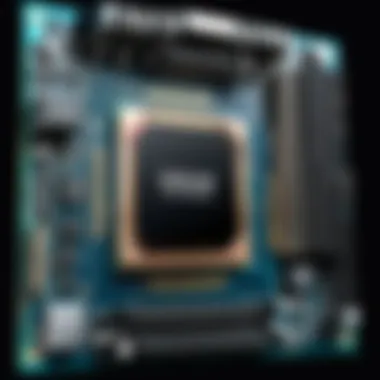Choosing the Best CPU for 4K Gaming Performance


Intro
In the current landscape of gaming, 4K resolution is increasingly becoming the gold standard that enthusiasts chase after. This leap in clarity and detail is not just about having the shiniest graphics; it’s about immersion, responsiveness, and performance. The Central Processing Unit, or CPU, plays a dominant role in this equation. Selecting the right CPU can make or break a gaming experience, particularly when delving into soul-stirring graphics that 4K provides.
Why Focus on CPUs? While many gamers immediately focus on powerful graphics cards, the CPU is equally pivotal. It handles game logic, processes input, and manages how data flows between components. This underpins everything from framerates to load times.
A strong CPU can keep your frame rates high, allowing you to enjoy a smoother experience while gaming at 4K.
This article will examine the core aspects of selecting a CPU for 4K gaming. We will cover critical performance metrics, compatibility with graphics cards, and consider future technologies. As we turn the pages, both enthusiasts and casual gamers will find valuable insights tailored to their unique gaming set-ups.
Lastly, we will also touch upon the current trends that impact gaming and how to select the optimal CPU that enhances your experience while gaming at high resolutions.
Let’s dive into the depths of esports and gaming performance.
Understanding 4K Gaming
Understanding 4K gaming is vital for anyone keen on optimizing their gaming experience. As gaming technology has grown, so too have the resolutions, leading us to 4K, or 3840 x 2160 pixels. This leap in resolution means that gamers are now able to see details that were once just pipe dreams. However, it isn't just about pixels; the whole experience hinges on several critical factors that intertwine to create immersive gameplay. The right CPU plays a pivot role in harnessing this potential, so let’s delve deeper into the specifics.
Defining 4K Resolution
In essence, 4K resolution elevates the gaming visuals to a completely new level. With four times the pixel count of 1080p, it offers sharper and crisper images. This means textures appear more detailed, landscapes become richer, and characters look more lifelike. For example, when playing a game like Cyberpunk 2077, details in the neon lights, reflections in water, and character features are strikingly realistic compared to lower resolutions.
- What you need to know about 4K resolution:
- The term "4K" stems from the horizontal pixel count of approximately 4,000.
- It’s often referred to as "Ultra HD" or UHD as well.
- Requires TVs or monitors capable of displaying this resolution to fully appreciate the visuals.
Higher resolutions demand more from the hardware, particularly the CPU and GPU. This dual dependence ensures that if one falters, the other cannot function optimally.
The Importance of Frame Rate
Frame rate, expressed as frames per second (FPS), is another cornerstone of 4K gaming. It's not merely a matter of pretty pixels; smooth gameplay hinges on this metric. The relationship between frame rate and 4K resolution is significant. While playing a high-octane game where every second counts, low frame rates can lead to choppy visuals and lag, which can seriously dampen the gaming experience.
- Why frame rate matters:
- A higher FPS leads to smoother gameplay.
- Competitive gamers often aim for a minimum of 60 FPS to stay competitive.
- imbalances can lead to what’s known as stuttering or tearing, critical distractions in fast-paced environments.
Achieving higher frame rates at 4K requires not just a robust GPU, but a solid CPU to keep up with the demand of processing and rendering the graphical data quickly. Game titles like Call of Duty: Modern Warfare can illustrate this vividly where every frame can make or break the experience.
Impact on Visual Fidelity
Visual fidelity refers to the overall quality and realism of the visuals being rendered on the screen. In 4K gaming, this aspect takes on particular importance. The clarity and depth of the visuals directly affect how engaging a game can be. Games designed with 4K in mind employ elaborate lighting techniques, detailed textures, and realistic shadows, which all contribute to an immersive environment.
- Key Components of Visual Fidelity:
- Textures: High-resolution textures make objects look more lifelike.
- Lighting: Dynamic lighting effects can change the ambiance and mood of a scene, making it feel more realistic.
- Shadows: Well-rendered shadows can enhance depth perception, drawing players further into the game world.
By investing in a competent CPU, gamers can unlock these advanced graphical capabilities. When selecting a CPU, it’s critical to consider how well it can complement the graphics card to boost overall visual fidelity. The interplay of these elements ensures that your gaming experience is not just an activity but an adventure.
Central Processing Unit Fundamentals


When diving into the world of 4K gaming, understanding the Central Processing Unit (CPU) is crucial. It’s the brain of your computer, dictating how well it performs under high demands, such as those presented by modern gaming. A proper grasp of the CPU fundamentals will enable gamers to make informed choices that can greatly enhance their gaming experience by ensuring higher frame rates and quicker load times.
CPU Architecture
The term "CPU architecture" refers to the design and layout of the CPU, which directly impacts its efficiency and performance. Think of it like the foundation of a house; if the base is weak, nothing above it will stand well. Architectural elements, such as instruction sets and caching technology, play a significant role in how well a processor can handle the demanding tasks of 4K gaming.
For instance, modern CPUs often use architectures like AMD’s Zen or Intel’s Core. These setups allow for better multitasking and higher performance during intensive gaming sessions. With 4K resolutions pushing hardware to its limits, an optimized architecture can lead to notably smoother gameplay.
Core Count and Thread Count
In contemporary CPUs, the core and thread count are vital metrics for performance. Cores are like individual workers, handling tasks, while threads are akin to the ability of each worker to multitask. For gaming, having a higher core and thread count can drastically improve performance in demanding titles, especially those that utilize advanced physics or AI systems.
It’s worth noting that many modern games are optimized to take advantage of multiple cores, meaning that going for a CPU with six cores or more can yield significant benefits. For instance, AMD Ryzen processors often offer a higher core count compared to their Intel counterparts, making them especially appealing for gamers seeking the best bang for their buck.
Clock Speed and Performance
Clock speed, measured in gigahertz (GHz), indicates how fast a CPU can execute instructions. It’s a common misconception that higher clock speeds always result in better performance, as this is only part of the story. Factors such as architecture and core count also play pivotal roles. However, a higher clock speed can still lead to improved performance, particularly in single-threaded tasks which many games rely upon.
In essence, a well-balanced CPU that combines a robust architecture, ample core and thread count, and a competitive clock speed will provide the best performance for 4K gaming. For example, the Intel Core i9-11900K is often celebrated for its leading clock speeds and efficient architecture, making it a strong contender for serious gamers.
Understanding these CPU fundamentals is key to stepping into the realm of optimal 4K gaming performance.
When gamers consider these technical specifications, they set themselves up for a gaming experience that can truly shine in 4K resolution. It’s about finding the right balance that meets both the gaming ambitions and the budget constraints of the individual.
Key Factors in Selecting a CPU for 4K Gaming
Choosing the right CPU for 4K gaming isn’t just about speed and specs; it encompasses several important factors. It’s like building a house, where every brick counts — and in this case, the bricks are the various elements that can affect your gaming experience. As you think about how to optimize your setup, consider these vital aspects:
Compatibility with Graphics Cards
When it comes to 4K gaming, the CPU and GPU (Graphics Processing Unit) work hand-in-hand, like a well-coordinated dance. The GPU often steals the limelight, but the CPU is the unsung hero that drives overall performance. It’s crucial to ensure that your CPU is not a bottleneck for your graphics card.
- When you’re picking a CPU, check the TDP (Thermal Design Power)—both the CPU and GPU should fall within compatible ranges. Mismatch here can lead to overheating and subpar performance.
- Also, pay attention to the PCIe version. Modern GPUs benefit from PCIe 4.0, while older CPUs might only support PCIe 3.0, limiting potential performance gains.
A solid pairing can make all the difference. So, make sure you research which models work seamlessly together before making a move.
Heat and Cooling Solutions
4K gaming can push hardware to its limit, generating a good deal of heat in the process. Too much heat can throttle performance, leading to reduced frame rates and stuttering gameplay. It’s essential to consider your cooling solution as part of your CPU selection.
- Air vs. Liquid Cooling: Air cooling is convenient and often sufficient, but liquid cooling can handle high-performance CPUs more effectively, especially if you plan to overclock.
- Case Airflow: Make sure your gaming rig has excellent airflow. If your case is cramped, you could be setting yourself up for overheating, regardless of your cooling solution.
Therefore, fair to say, investing in a good cooling system is just as vital as picking the right CPU. Ignoring this aspect could lead to a frustrating gaming experience.
Motherboard Considerations
The motherboard acts as the backbone of your gaming setup. Choosing the wrong one can lead to compatibility issues that can sour your entire experience. Here’s what to keep in mind:
- Socket Type: Ensure the motherboard supports the CPU socket type you’re choosing. For instance, AMD Ryzen processors require an AM4 socket, while Intel's latest CPUs often utilize LGA 1200 or LGA 1700.
- Chipset Features: Different chipsets offer various functionalities like support for overclocking or more USB ports. Identify your gaming needs and select a motherboard that complements those requirements.
- Future Upgrade Paths: Consider the long-term. Will this motherboard allow future CPU upgrades without having to start from scratch?
"The motherboard isn't just a base; it dictates the limits of what your system can achieve."


So, get your motherboard decision right. It’s far too easy to overlook these details, yet they can make or break your gaming experience.
In essence, selecting a CPU for 4K gaming requires careful consideration of not just the raw power of the processor, but also how it integrates into the larger ecosystem of your gaming setup. Each of these factors plays a part in ensuring that your system can handle the demands of high-resolution gaming and provide an enjoyable experience.
Evaluating Performance for 4K Gaming
Understanding how to evaluate performance specifically for 4K gaming is essential for gamers who want a smooth and visually stunning experience. This process goes beyond just picking a powerful CPU; it involves looking at various performance metrics that can influence gameplay and overall enjoyment. Evaluating performance not only helps in selecting a CPU but also in understanding how well it will pair with other components in your gaming rig.
Real-World Gaming Benchmark Analysis
When it comes to benchmarking, not all tests are created equal. Real-world gaming benchmarks provide insights into how a CPU actually performs under different gaming conditions and settings. These benchmarks often take into account several variables, including:
- Game Title: Different games utilize CPUs differently. For instance, Cyberpunk 2077 might stress the CPU more than Stardew Valley, even at 4K resolution.
- Settings: Are you playing with ray tracing enabled? This demand shifts the performance requirements dramatically.
- Resolution and Frame Rates: What are the frame rates at 4K with varying settings? High frame rates can dramatically enhance gaming feel and responsiveness.
The methodology for conducting these tests usually includes running the game multiple times under the same conditions and averaging the results. This gives potential buyers a practical perspective on how their desired CPU performs in the gaming scenarios important to them.
Frametime Variability and Its Effects
Frametime, or the time taken for a single frame to be rendered, is often a more telling metric than mere frame rates. It can reveal inconsistencies in performance that might not be visible if only looking at averages. Variability in frametime can lead to stuttering, which undermines the smooth experience gamers expect at high resolutions like 4K. Some noteworthy points include:
- Importance of Frame Consistency: A CPU may deliver high average frame rates, but if those frame times fluctuate widely, gameplay can feel jittery and unresponsive.
- Impact on Competitive Gaming: For eSports enthusiasts, even small fluctuations can be the difference between victory and defeat. Players often feel a sharper perception of responsiveness with lower and more consistent frametime.
- Measurement Tools: Software like MSI Afterburner or Fraps allows gamers to record and analyze frametime data, offering insights that can lead to hardware adjustments or tuning.
By focusing on frametime variability, gamers can get a clearer understanding of how a CPU will perform in a real-world environment, especially when things get heated in-game.
Overclocking Potential
Overclocking can be a game changer, allowing users to push their CPUs beyond standard specifications to achieve better performance with minimal investment. Here are a few considerations:
- Performance Increase: Properly executing overclocking can yield significant boosts in performance, particularly in CPU-bound scenarios common in certain games.
- Cooling Solutions: The right cooling is vital. Overclocking generates extra heat, so quality cooling solutions ensure stability and longevity.
- Motherboard Features: Different motherboards offer varying levels of support for overclocking. Features such as robust power delivery and easy BIOS access can make or break one's overclocking ambitions.
Culmination
Evaluating the performance of CPUs for 4K gaming is intricate but essential to ensure that gamers', whether casual or hardcore, technical needs are met. By focusing on real-world benchmarks, frametime variability, and the potential for overclocking, individuals can navigate the often confusing landscape of CPU selection with greater confidence and foresight.
CPU Recommendations for 4K Gaming
When it comes to enjoying the vibrant worlds of 4K gaming, selecting the right CPU is as critical as choosing the right GPU. A capable processor can not only enhance the visual experience by maintaining high frame rates, but it also plays a vital role in overall system responsiveness during intense gaming sessions. While GPU often steals the spotlight for graphics-intensive tasks, the CPU holds its ground by managing game mechanics, physics, and real-time calculations. Finding the sweet spot between cost and performance can be a sometimes tricky endeavor, but understanding what each category of CPU offers helps inform buyers on their journey.
High-End CPUs for Ultimate Performance
For gamers looking to push the boundaries, high-end CPUs are where the magic happens. Processors like the Intel Core i9-13900K or AMD Ryzen 9 7950X are prime examples, showcasing jaw-dropping performance.
- Robust Architecture: These CPUs are built to handle multiple threads simultaneously, allowing games that thrive on high core counts to run like a breeze.
- Extreme Clock Speeds: Equipped with impressive boost clocks, they easily manage demanding 4K titles while providing stunning load times.
- Overclocking Capability: High-end CPUs unlock potential for enthusiasts wanting to push their systems further with advanced cooling solutions.
Among the countless benchmarks overshooting the charts, it’s particularly useful to browse forums discussing real-world usage. Gamers report smoother gameplay, less stuttering, and the capability to manage streaming with minimal performance hits as notable benefits.
"High-end CPUs are not just about gaming; they’re the backbone for creative tasks too, making them versatile for those who dabble beyond gaming."
Mid-Range Options for Balanced Gameplay
Stepping down a notch doesn’t necessarily mean sacrificing quality. Processors like the AMD Ryzen 5 7600X and the Intel Core i5-13600K stand as solid options for gamers who want a balance between performance and price.


- Strong Performance: These CPUs offer nearly all the essential features needed to enjoy 4K gaming without breaking the bank. They’re designed to offer high frame rates at acceptable settings in most modern titles.
- Power Efficiency: Mid-range options generally require less energy consumption, which can lead to reduced heat output and lower electricity bills, making them easier on overall system requirements.
- Future Proofing: They also strike a decent balance between initial cost and lifespan, ensuring that you'll be able to enjoy newer titles for a while as gaming requirements evolve.
With plenty of benchmarks available, it’s impressive to note how many titles run smoothly with these chips, preserving high-quality graphics without excessive costs. Enthusiast communities often share detailed assessments based on various game setups.
Budget-Friendly Alternatives
Not every gamer has a vault of gold to invest in high-tier hardware. For those on a tighter budget, options like the AMD Ryzen 5 5600G or Intel Core i3-12100 still deliver a commendable gaming experience.
- Affordability: These options provide access to 4K gaming without outrageous costs. Budget CPUs often serve to enact solid performance in older or less demanding games albeit at lower graphics settings.
- Integrated Graphics: Many budget processors feature integrated graphics, which is a boon for casual gamers or those who may not yet have a dedicated GPU.
- Decent Value: Though they may lag behind in raw performance power, their ability to deliver respectable experiences makes them wise choices for anyone getting into 4K gaming without maxing out their wallets.
In communities online, gamers often share tips on how to maximize performance when using budget chips, also a great way to learn from others' experiences.
Selecting the right CPU is an intricate process requiring consideration of not just the price tag but the overall gaming experience desired. With options ranging from high-end powerhouses to budget savers, understanding the core attributes of each can make all the difference in achieving that stunning 4K experience.
Future Trends in CPU Development for Gaming
The realm of gaming is a rapidly evolving landscape, and CPUs play a crucial role in this transformation. As gamers increasingly pursue immersive experiences that demand high performance, understanding the future trends in CPU development becomes not only relevant but essential. Knowing what lies ahead helps consumers make informed decisions now, ensuring their investment will hold up against the tide of technological advancements. Looking toward the horizon, several facets emerge that warrant attention.
Emerging Technologies in CPU Design
In the quest for superior performance, several emerging technologies are reshaping CPU design. One noteworthy trend is the shift towards heterogeneous computing. This approach incorporates multiple types of processors—like combining CPU cores with GPU-like architectures within a single chip. The benefits of this design are significant; it allows for more efficient processing of tasks that can be parallelized, such as rendering detailed graphics at 4K resolution.
Another advancement is the rise of chiplet architectures. Instead of traditional monolithic designs, chiplets allow manufacturers to assemble various small chips to create a more powerful processor. This flexibility not only maximizes performance-by combining different core types for individualized tasks—but also reduces costs and enhances manufacturing efficiencies.
Additionally, the move towards smaller fabrication processes—such as transitioning from 7nm to 5nm technology—results in chips that are not only faster and more efficient but also consume less power. This is particularly important for gamers who may push their hardware to the limits and need cool, reliable performance without overheating.
"Future CPUs are set to embrace versatility like never before, catering to the specialized demands of gamers today."
As one considers these emerging technologies, it is clear that the next wave of CPUs will not just be about increasing raw power but also about doing so intelligently and efficiently.
Anticipated Shifts in Gaming Requirements
As the technology around gaming evolves, so too do the requirements that dictate how gamers experience their favorite titles. In particular, the advancements in graphics technology, such as Ray Tracing, are transforming the expectations around performance. Future gaming titles are likely to demand greater processing power to render realistic visuals—pushing CPU requirements higher than in previous generations.
Moreover, the proliferation of VR (virtual reality) and AR (augmented reality) gaming adds another layer of demand. These formats require not only high frame rates but also consistent performance during intense gameplay scenarios. Gamers will need CPUs capable of maintaining low latency and fast processing times to fully enjoy these experiences.
Another shift to note is the rise of cloud gaming. Services that allow players to stream games directly to their devices can alter how CPUs and their respective speed and capabilities are viewed. As more gamers rely on internet connectivity over powerful local hardware, CPUs will need to adapt to ensure a seamless experience, accommodating increased data transfer and minimizing bottlenecks.
Ending: Making an Informed Decision
In the realm of 4K gaming, selecting the right CPU is not just a matter of picking the latest model. It goes deeper than that. An informed decision involves understanding how various components interact, gauging performance metrics, and considering future gaming trends. The CPU acts as the brain of your gaming setup, dictating how well your system can handle the demands of high-resolution visuals and complex game mechanics.
Making a well-rounded choice brings with it numerous benefits. For one, it ensures smoother gameplay. When a CPU matches well with your graphics card, it eliminates bottlenecks that can lead to lag or dips in frame rates. Moreover, future-proofing your gaming setup becomes achievable. By investing in a now robust CPU, you can extend the lifespan of your rig, accommodating future advancements in gaming technology and graphic fidelity.
Summary of Key Insights
When contemplating your CPU options for 4K gaming, several key insights emerge from our discussion:
- Performance Metrics Matter: Understand how clock speed, core count, and architecture affect gaming performance.
- Compatibility Is Crucial: Ensure that your CPU can communicate effectively with the rest of your hardware, particularly your graphics card.
- Thermal Management: A capable cooling solution cannot be overlooked. It plays a significant role in maintaining optimal performance during intense gaming sessions.
- Value for Money: High-end CPUs offer stellar performance, but mid-range and budget options can also provide satisfying experiences if chosen wisely.
These points serve as a launching pad for further exploration. It’s not just about meeting the current gaming demands but being prepared to evolve with the rapidly changing landscape of technology.
Encouragement for Continued Research
The world of gaming hardware is constantly evolving. As technology develops, so too do the requirements and possibilities for gaming performance. Therefore, your journey doesn't end here. Keep digging deeper into the specifics of CPUs, graphics cards, and general gaming trends. Online communities, forums on platforms like Reddit, and tech-specific websites are rich with discussions that can offer varied perspectives and insights.
Furthermore, stay informed about emerging technologies like chips built on new architectures or integrated solutions that may redefine gaming. Engaging with various resources ensures you stay ahead of the curve when making purchasing decisions. Each new piece of information could very well impact how you configure your gaming system, whether you are a casual player or a serious esports contender.



